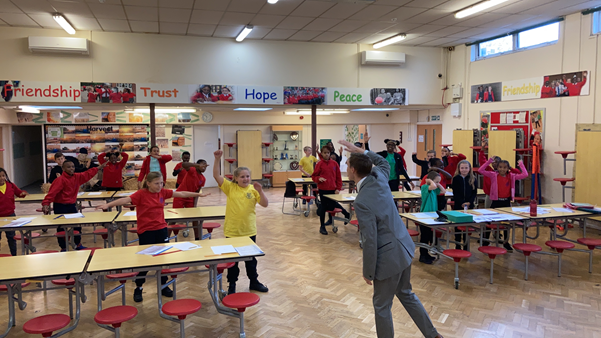Music curriculum statement

In William Ford Church of England School, we have a long history of successful music within our school. Our music curriculum promotes life in all its fullness and our Christian ethos: ‘learning from Jesus Christ, the Prince of Peace, to work diligently, act generously and live at peace with everyone’ through units and experiences children encounter. Children have the opportunity to reflect deeply on music they listen to, including the message behind lyrics; be ambitious in composition and develop musically in a purposeful environment.
Intent
-
Our music curriculum is broad and balanced. It is taught as a discrete subject as we believe this approach immerses our children within music, encouraging them to use musical vocabulary and begin to explore and analyse the pieces as a musician.
-
At William Ford, we recognise the intrinsic link between reading the symbols in musical notation and understanding patters within writing and as a step towards an understanding in algebra. We also use the number of beats in a bar to help children to work out the length of notes – using mathematical reasoning. The songs in our curriculum have been selected to develop upon PSHE related topics.
-
Our music curriculum is a spiral curriculum, re-engaging children with the 7 inter-related dimensions of music and the concepts of composition, performance, listening and appraisal.
-
Our music curriculum is ambitious for all our children, including those with SEND, enabling every child to work to their full potential.
-
In keeping with our Christian ethos, each music unit of work is introduced through discussion and debate around ‘big questions’ that explore the use of music in worship and how music influences emotions.
-
Children share ideas, expressing their opinions when listening to live and recorded music.
-
In each unit, the end result is a performance of a piece of a piece of their own composition.
-
Children feel safe to try their best in each lesson and reflect on their own performances, celebrating success and considering how to improve.
-
Our music curriculum addresses physical (through warm-ups), mental (through experimentation), spiritual (through debating messages in pieces), cultural (through music from a variety of cultures) and intellectual (through notation reading) health of every child.
Implementation
-
Our music curriculum is purposeful and engaging (for example, in each unit children learn or compose a piece of music and perform it).
-
The key concepts within our music lessons are regularly revisited through our spiral curriculum, this enables our children to know more and remember as well as developing musically.
-
Children access their music lessons through high quality teaching during which they participate in a wide range of engaging learning experiences through composition, improvisation and listening.
-
There is a strong focus on children using musical vocabulary and notation throughout the elements of a lesson.
-
All music lessons build upon prior learning and have clearly defined end points.
-
In music lessons, teachers check pupils’ understanding effectively, identifying and correcting misunderstandings. Techers assess children’s development of rhythm and beat effectively, supporting children in a sensitive manner.
-
As part of our extra-curricular activities, the choir performs in a local care home, the shopping centre, the O2 (during Young Voices) and the playground (Colour Concert). They also take part in the annual music festival which includes a small cluster of local schools.
Impact
-
We evaluate the knowledge, skills and understanding that children have gained in their geography lessons against carefully planned end points to measure progression.
-
Our music curriculum ensures children have the knowledge and cultural capital to succeed in the next steps of their education.
-
In the monitoring of the music curriculum, we constantly strive for improvement through review and evaluation.
